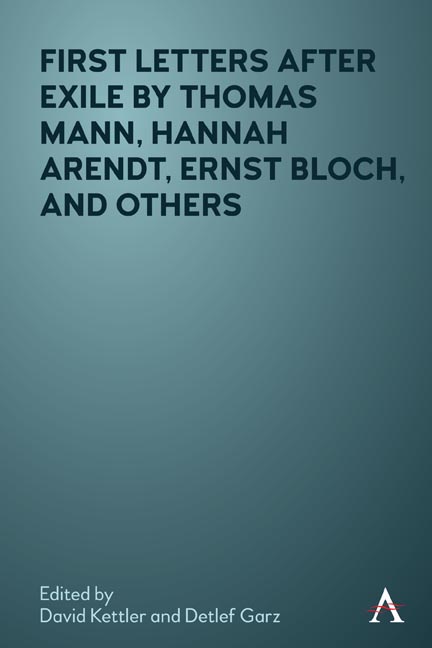Book contents
- Frontmatter
- Contents
- Preface
- Chapter 1 The “First Letters” Exile Project: Introduction
- Chapter 2 “That I Will Return, My Friend, You Do Not Believe Yourself ”: Karl Wolfskehl – Exul Poeta
- Chapter 3 “I Do Not Lift a Stone”: Thomas Mann’s “First Letter” to Walter von Molo
- Chapter 4 Faust Narrative and Impossibility Thesis: Thomas Mann’s Answer to Walter von Molo
- Chapter 5 “That I Am Not Allowed for a Moment to Forget the Ocean of Blood”: Hans-Georg Gadamer and Leo Strauss in Their First Letters after 1946
- Chapter 6 Return into Exile: First Letters to and from Ernst Bloch
- Chapter 7 A Postwar Encounter without Pathos: Otto Kirchheimer’s Critical Response to the New Germany
- Chapter 8 An Exile’s Letter to Old Comrades in Cologne: Wilhelm Sollmann’s Critique of German Social Democracy and Conception of a New Party in Postwar Germany
- Chapter 9 First Letters: Arendt to Heidegger
- Chapter 10 Denazification and Postwar German Philosophy: The Marcuse/Heidegger Correspondence
- Chapter 11 “It Would Be Perhaps a New Exile and Perhaps the Most Painful”: The Theme of Return in Oskar Maria Graf ’s Letters to Hugo Hartung
- Chapter 12 Social Constellation of the Exile at the End of the Second World War and the Pragmatics of the “First Letters”: An Objective Hermeneutic Structural and Sequence Analysis
- Notes on Contributors
- Index
Chapter 7 - A Postwar Encounter without Pathos: Otto Kirchheimer’s Critical Response to the New Germany
Published online by Cambridge University Press: 25 February 2022
- Frontmatter
- Contents
- Preface
- Chapter 1 The “First Letters” Exile Project: Introduction
- Chapter 2 “That I Will Return, My Friend, You Do Not Believe Yourself ”: Karl Wolfskehl – Exul Poeta
- Chapter 3 “I Do Not Lift a Stone”: Thomas Mann’s “First Letter” to Walter von Molo
- Chapter 4 Faust Narrative and Impossibility Thesis: Thomas Mann’s Answer to Walter von Molo
- Chapter 5 “That I Am Not Allowed for a Moment to Forget the Ocean of Blood”: Hans-Georg Gadamer and Leo Strauss in Their First Letters after 1946
- Chapter 6 Return into Exile: First Letters to and from Ernst Bloch
- Chapter 7 A Postwar Encounter without Pathos: Otto Kirchheimer’s Critical Response to the New Germany
- Chapter 8 An Exile’s Letter to Old Comrades in Cologne: Wilhelm Sollmann’s Critique of German Social Democracy and Conception of a New Party in Postwar Germany
- Chapter 9 First Letters: Arendt to Heidegger
- Chapter 10 Denazification and Postwar German Philosophy: The Marcuse/Heidegger Correspondence
- Chapter 11 “It Would Be Perhaps a New Exile and Perhaps the Most Painful”: The Theme of Return in Oskar Maria Graf ’s Letters to Hugo Hartung
- Chapter 12 Social Constellation of the Exile at the End of the Second World War and the Pragmatics of the “First Letters”: An Objective Hermeneutic Structural and Sequence Analysis
- Notes on Contributors
- Index
Summary
In trying to understand the first epistolary attempts of the German and Austrian exiles in the United States to reconnect with friends and acquaintances in their respective countries after the Second World War, we would expect a difficult and protracted process of negotiation, ambivalence, and hostility punctuated by a recognition that one cannot simply change one's history, one's identity, or, for that matter, turn one's back on friends of the past. But not all the exiles responded in this way. Indeed, in the example I want to examine, that of the first communications of the noted left political scientist and legal theorist, Otto Kirchheimer, there seems to be no such existential complications but rather a direct engagement with the politics and academic structure of postwar Germany, one that is at once critical, skeptical, and yet politically knowledgeable and located. In this presentation, I would like to suggest that Kirchheimer's attitude may represent a whole species of cases. Furthermore, it may tell us something about the difference between the kinds of exiles who were able to reengage with the home country without complications—though interestingly not live in it—and those from whom this reengagement was a constant struggle of cultural and political identity.
In seeking to attempt to make sense of the émigré who does not manifest a sense of damage by the émigré experience, I looked at the letters of Otto Kirchheimer in the SUNY Albany refugee collection. I found very few letters from the period of the late 1940s devoted to reconnecting with the country left behind. However, there is a rather curious interchange from 1948 in which Kirchheimer was invited by the Kultusminister of Hessen, a certain Dr. Stein, to take up a guest professorship for a year in the law faculty at the University of Frankfurt. Stein had been very critical of the university's reluctance to offer positions to emigrants who had been forced out of Germany, and his invitation was part of his attempt to rectify this situation. Kirchheimer responded he would be pleased to accept the invitation but suggested that to avoid prior conflicts the law faculty should contact him directly. According to a letter from George Dietrich to Hermann Brill, who eventually received the position, no one ever contacted Kirchheimer again.
- Type
- Chapter
- Information
- Publisher: Anthem PressPrint publication year: 2021



